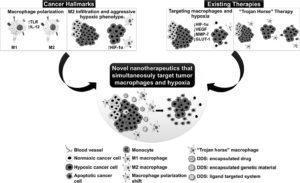Macrophages are specialised cells that have a pivotal role in protective innate immunity, but are also implicated in immunopathology of several diseases including cancer. In this context, the analysis of the tumor microenvironment is essential for the understanding of cancer progression because tumor cells can interact with different cell types or soluble molecules. Macrophages found in the tumor microenvironment are called tumor-associated macrophages (TAMs). The role of TAMs are controversial; however, detection of TAMs are more related with poor prognosis.
During tumor progression, circulating monocytes are recruited into the tumor, where interaction with growth factors, cytokines, chemokines and other molecules will induce differentiation into macrophages. It has been establish that macrophages can acquire a pro-inflammatory phenotype (M1) mediated by INF-y, LPS and an activation of STAT1 and NF-κβ; in contrast the stimuli mediated by IL-4, IL-10, IL-13 and the activation of STAT3/STAT6 will induce a immunoregulatory phenotype (M2).
Cervical Cancer (CC) is the fourth most common cancer in women worldwide which is often associated with high risk HPV infection with either HPV16 and HPV18. HPV can use several mechanisms to down-regulate the innate and cell mediated immune response, including changes in the differentiation of macrophages into the M2 phenotype. In this study, Sánchez-Reyes et al., evaluated the effect of supernatants from CC derived-cell lines (HeLa, SiHa and C-33A) on the phosphorylation of STAT1, NF-κβ-p65 and STAT6 and the impact in the secretion profile of cytokines and growth factors by macrophages derived from U937 cells. They report that the supernatants induce a decrease in the phosphorylation of NF-κβ-p65 and STAT1 but an increase in the secretion of IL-10, IL-6, MCP-1, IL-8, PDGF-AA, PDGF-BB and VEGF.
Overall, these results suggest that soluble molecules secreted by CC-tumor cells down-regulate the activation of transcription factors related to M1 macrophages (STAT1 and NF-κβ-p65) but induce the secretion of molecules that promotes the tumor growth.
Journal Article: Sánchez-Reyes et al., 2019. The supernatant of cervical carcinoma cells lines induces a decrease in phosphorylation of STAT-1 and NF-κβ transcription factors associated with changes in profiles of cytokines and growth factors in macrophages derived from U937 cells. Innate Immunity
Article by Christian David Barreto Vargas












